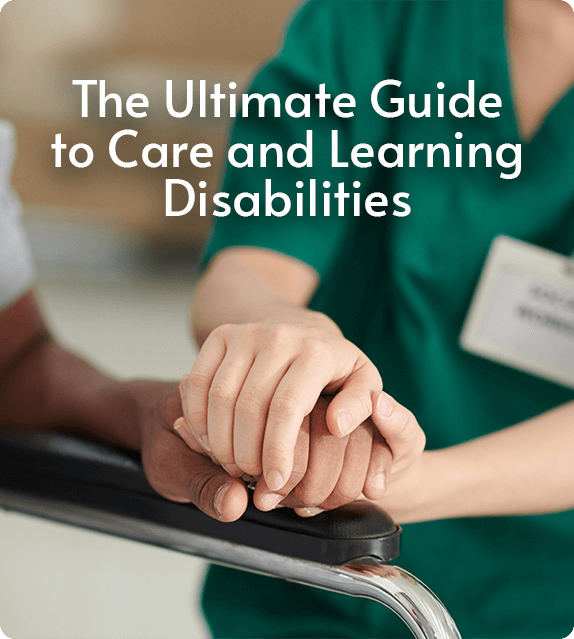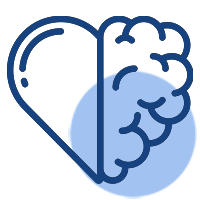The Ultimate Guide to Care and Learning Disabilities for Skilled Healthcare Professionals
£ 199.00

Are you looking to embark on a rewarding career path in the healthcare sector that allows you to make a meaningful impact on individuals' lives?
If you answered yes, our course is the perfect choice for you! This comprehensive program equips you with the knowledge and skills necessary to provide exceptional care and support to individuals with learning disabilities. Whether you're an aspiring care professional or someone already working in the field, this course will open doors to exciting career opportunities and empower you to make a positive difference in the lives of those in need. Enrol now and start your journey toward a fulfilling and impactful career in the care sector.
Comprehensive Learning and Practical Skills
The comprehensive nature of this course ensures that you are well-prepared to address the complex and multifaceted needs of individuals with learning disabilities. We believe in the importance of hands-on, practical skills that can be immediately applied in real-life caregiving situations. Throughout the course, you'll engage in practical exercises, case studies, and simulations that simulate the challenges you may encounter in your role as a healthcare professional. This hands-on approach allows you to develop practical skills such as effective communication, problem-solving, and person-centered care techniques.
Key Advantages of the course

Person-Centered Care Excellence
Imagine being able to provide care that is truly tailored to the individual—this is the essence of person-centered care, and it's at the heart of our course. Participants will delve into the captivating world of understanding, respecting, and responding to the unique needs and preferences of individuals with learning disabilities. This approach goes beyond routine caregiving; it's about forging authentic connections, promoting independence, and improving the overall quality of life for those you care for. The ability to deliver person-centered care is a profound and deeply satisfying aspect of our course, allowing participants to make a positive, lasting impact on the lives of individuals with learning disabilities.
Legal and Ethical Insights
The legal and ethical dimensions of learning disability care are intellectually stimulating and crucial for responsible caregiving. Our course delves into these intriguing areas, providing participants with a comprehensive understanding of the legal frameworks, legislation, and ethical considerations that govern this field. It's not just about knowing the rules; it's about understanding how to apply them in real-world situations, ensuring the rights and well-being of individuals with learning disabilities are upheld. This aspect of the course offers participants a chance to engage with complex ethical dilemmas, encouraging critical thinking and ethical decision-making—a valuable skill set that extends far beyond the classroom.
Key Advantages of UniqSkills
Flexible Learning: Uniqskills offers a user-friendly platform that allows participants to access course materials and complete assignments at their own pace, accommodating various schedules.
Expert Instructors: Courses on Uniqskills are taught by experienced professionals and subject matter experts, ensuring high-quality education.
Certification: Completing courses on Uniqskills results in certifications, enhancing participants' employability and career prospects.
Engaging Learning: Uniqskills offers captivating multimedia materials that turn education into an inspiring journey, fostering active participation and enjoyment.
Applied Learning: Participants gain hands-on experience and problem-solving skills directly applicable to real-life scenarios, enhancing their readiness for their chosen careers.
By completing the course, participants will:
- Expert Knowledge: Gain expert-level knowledge about learning disabilities, their impact, and effective care strategies.
- Career Advancement: Open doors to diverse and rewarding career opportunities in the healthcare sector.
- Practical Skills: Acquire hands-on skills that can be immediately applied in real-world caregiving scenarios.
- Person-Centered Care: Master the art of person-centered care, enabling you to provide tailored support and foster independence.
- Legal and Ethical Competence: Navigate legal frameworks and ethical considerations with confidence, ensuring responsible and ethical caregiving.
- Inclusivity and Diversity: Learn to work effectively with individuals from diverse backgrounds and with various needs, promoting inclusivity and equality.
- Credibility: Receive recognition and accreditation, enhancing your credibility and employability in the healthcare industry.
- Respected Qualification: Earn a respected qualification that demonstrates your expertise in learning disability care and sets you apart in the job market.
- Enhanced Communication Skills: Develop effective communication skills, enabling you to connect with individuals with learning disabilities and build trust and rapport.
- Diverse Learning Resources: Access a wealth of learning resources, including case studies, simulations, and interactive materials that make learning engaging and practical.
- Personal Growth: Experience personal growth as you learn to empathise, advocate, and provide invaluable support to individuals with learning disabilities.
- Better Employment Prospects: Improve your employment prospects by acquiring specialised skills and knowledge highly sought after in the healthcare sector.
- Positive Impact: Make a positive and lasting impact on the lives of individuals with learning disabilities, enhancing their well-being and quality of life.
- Continuing Professional Development: Lay the foundation for ongoing professional development and stay current with evolving practices in learning disability care.
- Versatility: Gain versatility in your career by being equipped to work in various care settings, adapting to different needs and challenges.
- Confidence: Build the confidence to handle complex caregiving situations with competence and compassion, ensuring the best possible care for individuals with learning disabilities.
Discover Why Our Course Is the Ideal Step in Your Educational Journey:

Why This Course Should Be Your Next Educational Step:
- In-Demand Skills: Learning disability care is an ever-growing field with a consistent demand for skilled professionals. By taking this course, you equip yourself with highly sought-after skills that can lead to numerous career opportunities.
- Rewarding Career: Few professions are as rewarding as providing care to individuals with learning disabilities. This course opens the door to a career where you can make a genuine, positive impact on people's lives every day.
- Specialised Knowledge: You'll gain specialised knowledge in learning disabilities, person-centered care, legal and ethical considerations, and more. This expertise is invaluable for effective caregiving.
- Immediate Application: The practical skills you acquire are immediately applicable, ensuring that you're well-prepared to excel in your caregiving role from day one.
- Career Advancement: Completing this course enhances your career prospects. You can explore diverse roles in care settings like homes, day centers, and community support services.
- Ethical Care: You'll learn to navigate complex legal and ethical considerations, ensuring that you provide care responsibly and ethically, aligning with established guidelines.

Is This Course Worth Trying? Absolutely!
- The course equips you with the skills and knowledge needed to excel in a rewarding and dynamic field.
- You’ll gain a deep understanding of healthcare and social care principles, equipping you with essential knowledge for a career in these fields.
- It offers a pathway to make a meaningful impact on individuals and communities.
- You’ll develop hands-on skills in communication, person-centered care, and safeguarding people with learning difficulties to excel in real-world healthcare scenarios.
- With a strong focus on practical application, you'll be well-prepared for real-life healthcare scenarios.
- The certification enhances your employability and career prospects in the healthcare and social care sectors.
- This course is a valuable educational investment that can lead to a fulfilling and purpose-driven career.
What will you gain by taking part in the course?

New, current threads
During the lectures of this course, participants will gain in-depth insights into understanding learning disabilities, enabling them to recognise and empathise with the challenges faced by individuals with such disabilities. They will also receive expert guidance on providing person-centered care, navigating legal and ethical complexities, and promoting inclusivity, fostering a profound understanding of responsible caregiving. These insights and guidance will underscore the vital importance of taking this course, as participants will be empowered to make a meaningful impact in the lives of individuals with learning disabilities and embark on a fulfilling career in healthcare.

New skills
Participants in this course will acquire a diverse set of new skills, including the ability to provide person-centered care tailored to individual needs, enhancing their interpersonal communication and empathy. They will also develop proficiency in navigating legal and ethical considerations, ensuring responsible caregiving practices. Additionally, participants will gain expertise in recognising signs of abuse and safeguarding individuals with learning disabilities, making them well-rounded and effective healthcare professionals.

Practice
Participants in this course will engage in practical exercises and simulations that mirror real-world caregiving scenarios. They'll practice effective communication strategies, problem-solving, and person-centered care techniques, ensuring they're well-prepared for hands-on caregiving roles. Additionally, participants will have opportunities to apply their knowledge to case studies, reinforcing their ability to make informed and compassionate decisions in various caregiving situations.

Availability
Experience round-the-clock availability to course materials on any device, allowing for convenient learning at your chosen time and location. Utilise downloadable resources such as notes, videos, slides, and assessments to bolster your comprehension, driving better outcomes. Embrace the freedom to learn at your individual pace and leverage a comprehensive online learning experience accessible throughout the entire year.

Certification
Upon successful completion of the course, participants will receive a personalised certificate verifying their active participation and achievement.
This valuable document can be easily accessed and downloaded from the 'my panel' section within the UniqSkills platform.
This certificate serves as a tangible testament to your newly acquired skills, enabling you to proudly present your expertise to potential employers and within your professional network
Syllabus:
Understand Specific Learning Difficulties
Causes of Learning Disability
The effects of Specific Learning Difficulties
The diagnosis of Specific Learning Difficulties
Supporting individuals with Specific Learning Difficulties
The context of Specific Learning Difficulties
Challenging Behaviour of Adults with Learning Disabilities
Principles of safeguarding and Protecting People with Learning Disabilities
Assessment and Diagnosis of Learning Disability
Role of the Learning Disability Carer
Understanding Autism
Art Therapy for Children and Adults
Equality, Diversity and Inclusion Working with Children and Adults with Learning Difficulties
A Person-Centred Approaches in Health and Social Care settings
Health, Safety and Well-Being in Care Settings
Module 1: Understand Specific Learning Difficulties
- This module introduces learners to the concept of Specific Learning Difficulties and guides them in understanding the characteristics of different Learning Difficulties and associated conditions.
- The Participants will also gain insights into common misconceptions surrounding Specific Learning Difficulties and recognise that these difficulties are lifelong conditions, forming a basis for empathetic and informed care.
Module 2: Causes of Learning Disability
- Factors causing Learning Disability
- Classification of Learning Disability
- Abnormalities in sex chromosomes
- Abnormalities in genes
Module 3: The effects of Specific Learning Difficulties
- Effects on Individuals: How Specific Learning Difficulties impact individuals and those around them, fostering an understanding of the challenges they face.
- Social Attitudes and Impact: How societal attitudes can influence individuals with Learning Difficulties. Identify both strengths and barriers these individuals encounter and how these factors can affect their overall well-being and development.
Module 4: The diagnosis of Specific Learning Difficulties
- Understand the importance of gaining an early diagnosis and the impact of delayed or non-diagnosis.
- Investigate the diagnosis process and the professionals involved.
Module 5: Supporting individuals with Specific Learning Difficulties
- Understand how to support an individual with a Specific Learning Difficulty in different settings.
- Understand how to overcome barriers to communication
- Understand different coping strategies and assistive technology that can be used to support an individual.
- Understand the roles of professionals in providing support.
- How to address conflicts or dilemmas that may arise between an individual’s rights and the duty of care
- How to respond to complaints
Module 6: The context of Specific Learning Difficulties
- In this module learners will understand how attitudes, legislation and services have evolved over time to support individuals with Specific Learning Difficulties.
- The participants will outline relevant legislation, polices and guidance and understand how these are implemented to support individuals.
- Legal Framework on Learning Disability: The Mental Health Act 1983; The Disability Discrimination Act 1995; The Human Rights Act 1998; The Mental Capacity Act 2005.
Module 7: Challenging Behaviour of Adults with Learning Disabilities
Discover an escalating approach to improving attendance, develop skills to work collaboratively with parents, conduct effective home visits, chair meetings, and create assessment and action plans for intervention.
- Identifying Challenging Behaviour: This module focuses on recognising and understanding the various activities that may constitute challenging behaviour in adults with learning disabilities.
- Effective Response Strategies: Participants will explore different types of responses, learning how to react appropriately and effectively to address and manage challenging behaviour.
- Root Causes Exploration: The module also delves into the underlying causes of challenging behaviour, providing insights into the factors that contribute to such behaviour.
- Providing Care and Support: Participants will gain practical knowledge on how to provide compassionate care and support, enhancing their ability to assist individuals facing challenging behaviour while ensuring their well-being.
Module 8: Principles of safeguarding and Protecting People with Learning Disabilities
- Know how to recognise signs of abuse
- Know how to respond to suspected or alleged abuse or violence
- Understand the national and local context of safeguarding and protection from abuse
- Understand ways to reduce the likelihood of abuse or violence
- Know how to recognise and report unsafe practices
Module 9: Assessment and Diagnosis of Learning Disability
- Diagnostic Phenomena
- Screening Tools
- Diagnosis of Anxiety
- Panic Disorder
- Agoraphobia
- Social Phobia
- Specific Phobia
- OCD
- Affective Disorders
- Depression
- Schisophrenia
- Dementia
Module 10: Role of the Learning Disability Carer
- Essential Skills: This module highlights the fundamental skills and competencies required to excel in the role of a learning disability carer.
- Key Elements of Quality Care: Participants will explore the critical elements of providing excellent care, emphasising the principles of good caregiving.
- Work Settings: The module also outlines the various workplaces and settings where learning disability carers may operate, offering insights into the diverse environments in which their skills are in demand.
Module 11: Understanding Autism
- Introduction to autism
- Person-centred approach to support
- Communication and interaction
- Sensory processing and perception
- Supporting positive behaviour
- Healthy and fulfilled lives
Module 12: Art Therapy for Children and Adults
- Introduction to Basic Principles of Art Therapy (How did Art Therapy Develop?; The Basic Concepts of Art Therapy; How is Art Therapy Practised? How Art Therapy Works?)
- Creative Therapy (Art Therapy: Two Main Approaches; Principles and Types of Art Therapy; Dance, Drama and Music Therapy; Colour Therapy; Expressive Arts Therapy)
- Art Therapy for Children (Art Therapy and Child Development; Art Therapy vs Play Therapy)
- Art Therapy with Adults (Changes Related to Ageing; How Art Therapy Can Help Adults and Elderly?)
- Playtime (Art Therapy Techniques)
Module 13: On completion of this module you will:
- Understand the importance of diversity, equality and inclusion
- Understand how to work in an inclusive way
- Understand how to raise awareness of diversity, equality and inclusion
- Legislation and codes of practice in relation to inclusive practice
Module 14: A Person-Centred Approaches in Health and Social Care settings
On completion of this module you will:
- Understand person-centred approaches in social care
- Understand how to implement a person-centred approach in social care setting
- Understand the importance of establishing consent when providing care or support
- Understand how to implement and promote active participation
- Understand how to support an individual’s right to make choices
- Understand how to an promote individual’s well-being
- Understand the role of risk assessment in enabling a person- centred approach
Module 15: Health, Safety and Well-Being in Care Settings
On completion of this module you will:
- Understand the different responsibilities relating to health and safety in social care settings
- Understand risk assessments and their importance in relation to health and safety
- Understand procedures for responding to accidents and sudden illness
- Understand how to manage stress
- Understand the relationship between resilience and mental well-being
- Understand how mental well-being can be supported and managed
How do customers rate the course?
After changing careers, this course was a lifesaver. It's been incredibly helpful in my new role as a care assistant. Enrolling was quick, and I couldn't be happier with the real-life skills I gained.
I was skeptical at first, but this course exceeded my expectations. It's user-friendly and practical. I recently used the techniques learned here to help an individual with learning disabilities communicate better.
This course was just what I needed to kickstart my career. Enrolling was a piece of cake, and the skills I learned here helped me earn my first job in the healthcare sector. Couldn't be happier!
The Ultimate Guide to Care and Learning Disabilities for a Skilled Healthcare Professional
|
|||||||||||
|
Course Quality Guarantee ✔ 
|
|||||||||||
|
||||||